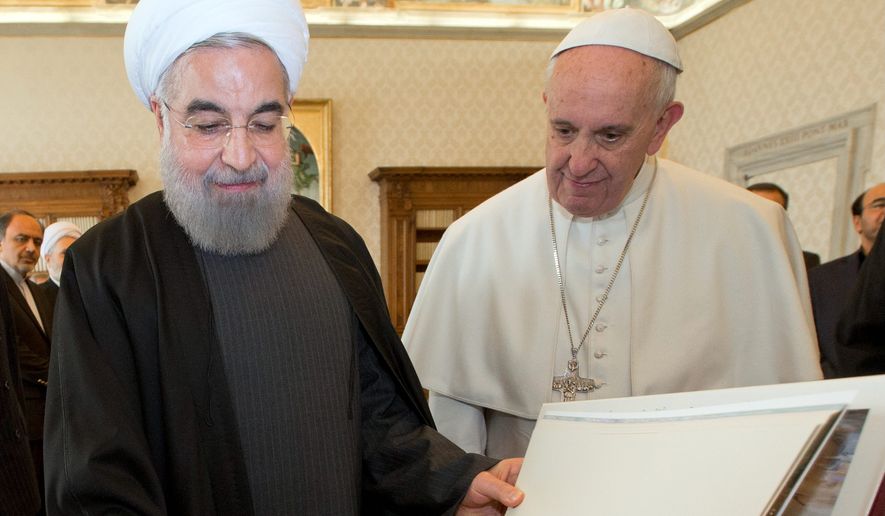For the second time in less than a week, Iran’s theocratic leaders have disqualified a slew of moderate candidates from the race for a key governing body, ruling that even the grandson of Iranian revolutionary hero Ayatollah Ruhollah Khomeini was too ideologically suspect to run for office.
In a blow to President Hassan Rouhani and the country’s embattled reformist factions, the 12-member Guardian Council, the group of top clerics that oversees elections and scrutinizes the suitability of candidates, approved just 166 of the 801 candidates applying to run for the Assembly of Experts, the body that nominally oversees Supreme Leader Ayatollah Ali Khamenei and, more crucially, would pick his successor if he dies in office.
The move comes just six days after the same council disqualified more than 7,000 of the 12,000 candidates seeking the right to run for parliament, a body currently dominated by hard-liners hostile to the United States and suspicious of the recent nuclear deal.
Both elections will be held Feb. 26, and in both cases, political analysts said the overwhelming majority of those blocked from running were reformists and moderates backing Mr. Rouhani’s agenda of ending Iran’s isolation and opening its economy to the West.
“The message to Rouhani and many others is that there are thick red lines at the heart of the establishment,” Hossein Rassam, a former political adviser to Britain’s embassy in Tehran, told the Reuters news agency.
In the parliamentary elections, for instance, reformers say the council approved just 30 of the roughly 3,000 moderate candidates seeking the right to run — less than 1 percent.
SEE ALSO: Hassan Rouhani, Iran’s president, bids for U.S. investment
“Hard-liners in Iran, led by Supreme Leader Khamenei, are obviously terrified of the political preferences of the Iranian people,” Hadi Ghaemi, executive director of the New York-based International Campaign for Human Rights, wrote in an analysis last week. “Forcing people to choose among a handful of candidates handpicked by the leader does not constitute a democratic election.”
President Rouhani, who met with Pope Francis Tuesday as part of a European tour seeking new deals and investment as nuclear sanctions come down, did not comment on Tuesday’s disqualifications. But he complained last week when so many of his likely political allies were blocked from the ballot.
Mr. Rouhani and his backers had hoped the signing of the nuclear deal and the prospect of new funds flowing into Iran’s stagnant economy would provide a major political boost ahead of next month’s vote.
“If there is one faction in and the other is not there, they don’t need the Feb. 26 elections,” Mr. Rouhani said in a speech late last week. “No official [body] without the vote of the people would be legitimate.”
Members of the Council of Guardians say most of the disqualifications came because the vetters could not verify the applicants’ credentials or fidelity to the Iranian revolution.
Khomeini’s grandson barred
Ironically, one of those barred Tuesday from seeking an eight-year term on the Assembly of Experts was Hassan Khomeini, the 43-year-old grandson of the late Ayatollah Khomeini.
Despite his revolutionary lineage, the younger Mr. Khomeini is considered a moderate on Iran’s political spectrum and an ally of President Rouhani and reformist politicians who were prominent in the 2009 Green Revolution that was vigorously suppressed by hard-line factions.
“Last night, it became clear that the Guardian Council could not approve the qualifications of my father and could not verify his credentials as an Islamic scholar,” Ahmad Khomeini, the candidate’s son and Ayatollah Khomeini’s great-grandson, wrote in an Instagram post Tuesday. The nominal reason was that the candidate missed a qualifying exam, but “I think the reason is clear for all,” the younger Mr. Khomeini wrote.
Rejected applicants can appeal their disqualifications, and there is some hope that more moderates may be allowed to run, but Iranian political observers say the council’s moves make it highly unlikely conservative hard-liners will lose their dominant position in either body after next month’s votes.
The disqualifications are just the latest sign that Ayatollah Khamenei, the 76-year-old supreme leader who has been the country’s final authority since Ayatollah Khomeini died in 1989, is intent on retaining his grip on power and the strategic course of the Islamic republic despite the signing of the nuclear deal.
Despite some hopes that the nuclear accord and the easing of sanctions would bring a thaw to Tehran’s relations with the U.S. and its allies, Iran has shown little sign to date of moderating its foreign policy.
The Obama administration earlier this month imposed new sanctions on Iranian individuals and entities to protest Iran’s October test of a medium-range ballistic missile in violation of U.N. Security Council Resolutions. Tensions have also soared between Iran and Saudi Arabia, a key U.S. ally, as their struggle for dominance in the region continues unabated.
And the supreme leader in recent days had strong praise for the rough handling of 10 U.S. sailors who mistakenly entered Iranian territorial waters earlier this month on a visit to the Islamic Revolutionary Guards Corps unit that seized the American boats. The sailors were held for 15 hours before being released.
“You did an excellent job,” the supreme leader told the unit, according to the Iranian semi-official Fars news agency.
“Certainly, it was the divine job that sent the Americans straying into our territorial waters only to be promptly captured with their hands behind their heads.”
• David R. Sands can be reached at dsands@washingtontimes.com.




Please read our comment policy before commenting.